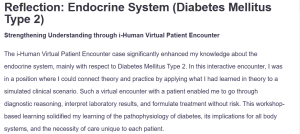Reflection: Endocrine System (Diabetes Mellitus Type 2)
Strengthening Understanding through i-Human Virtual Patient Encounter
The i-Human Virtual Patient Encounter case significantly enhanced my knowledge about the endocrine system, mainly with respect to Diabetes Mellitus Type 2. In this interactive encounter, I was in a position where I could connect theory and practice by applying what I had learned in theory to a simulated clinical scenario. Such a virtual encounter with a patient enabled me to go through diagnostic reasoning, interpret laboratory results, and formulate treatment without risk. This workshop-based learning solidified my learning of the pathophysiology of diabetes, its implications for all body systems, and the necessity of care unique to each patient.
Additional Study Techniques
The way to further strengthen my understanding of the endocrine system would be to incorporate the following study techniques:
Case-Based Learning
Find more case studies that can be relayed to the endocrine system disorders and analyze the same with regard to improving clinical judgment and decision-making.
Mind Mapping
The fact that a whole endocrine system interrelates among different secretions and target organs makes a visual representation of it necessary for better comprehension.
Discussion With Peers
By participating actively in regular study groups on difficult concepts, I get to share various insights and this enables me to go deeper into understanding different perspectives.
The i-Human Virtual Patient Encounter has been indicative of the pivotal role played by clinical judgment in the management of diabetes. This further illustrated that a treatment plan should be focused on individual factors in a patient, including age, lifestyle, and comorbidities. This experience has also re-entrenched the importance of considering a holistic approach toward the care of patients, looking not just at immediate symptoms but also at the long-term implications of the disease and its management (American Diabetes Association, 2022).
These added study techniques, coupled with reflection upon the virtual patient encounters, will help me to develop a deeper understanding of the endocrine system and enhance my ability to provide quality care for patients diagnosed with diabetes and other endocrine system disorders. As suggested by Forouhi and Wareham, (2019). Understanding the epidemiology of diabetes is crucial for developing effective prevention and management strategies.
References
American Diabetes Association. (2022). Standards of Medical Care in Diabetes—2022. Diabetes Care, 45(Supplement 1), S1-S264. https://doi.org/10.2337/dc22-Sint
Forouhi, N. G., & Wareham, N. J. (2019). Epidemiology of diabetes. Medicine, 47(1), 22–27. https://doi.org/10.1016/j.mpmed.2018.10.004
ORDER A PLAGIARISM-FREE PAPER HERE
We’ll write everything from scratch
Question 
Address the following questions:
- How did the i-Human Virtual Patient Encounter case help strengthen your understanding of the chosen body system?
- What additional study techniques will you incorporate to strengthen your understanding of the chosen body system?

Reflection: Endocrine System (Diabetes Mellitus Type 2)
Include the following components:
- write 150-300 words in a Microsoft Word document
- demonstrate clinical judgment appropriate to the virtual patient scenario
- cite at least one relevant scholarly source as defined by program expectations
- communicate with minimal errors in English grammar, spelling, syntax, and punctuation
- Reflection must be your original work and may not be re-used from prior coursework.